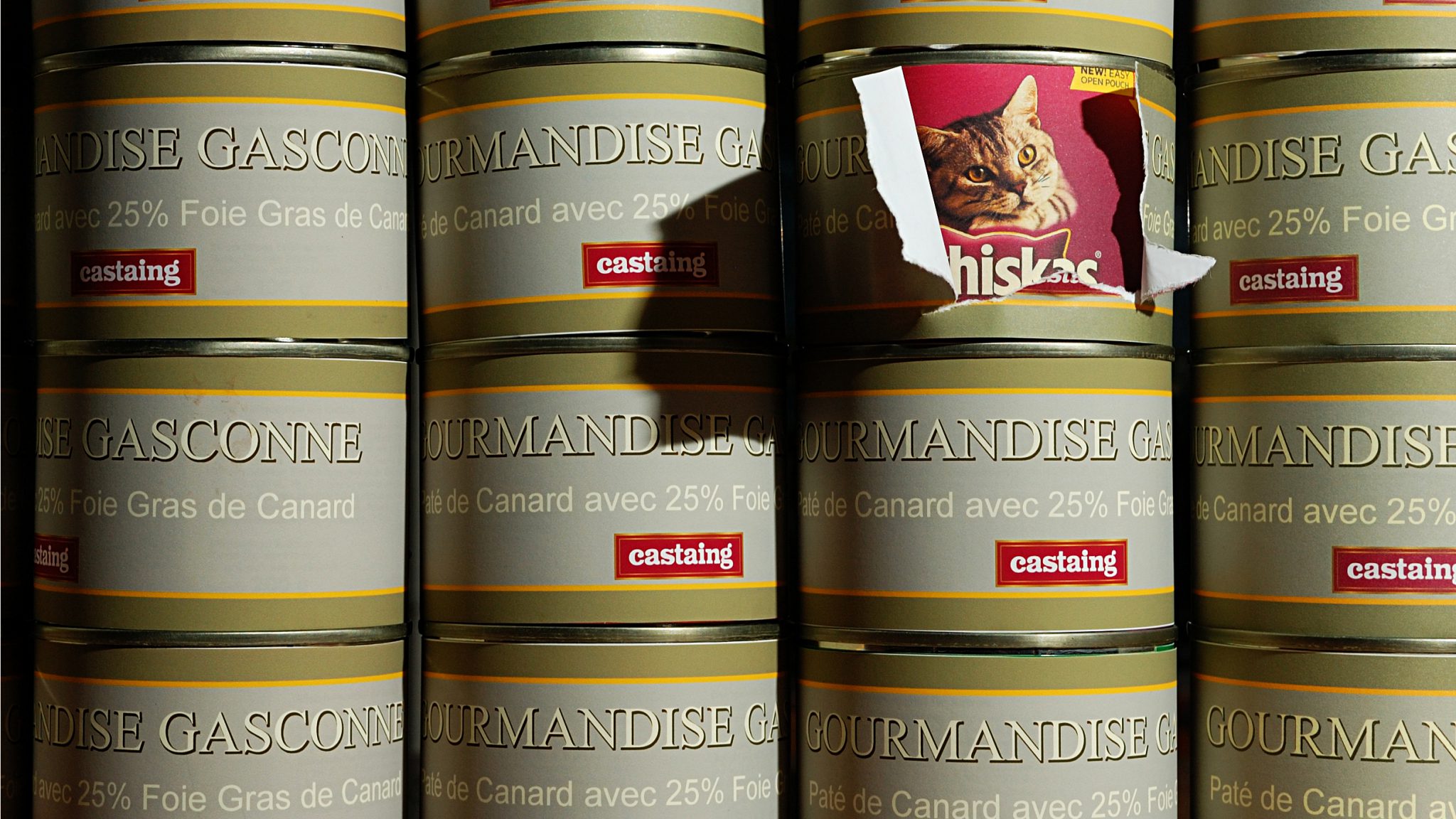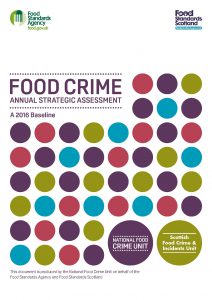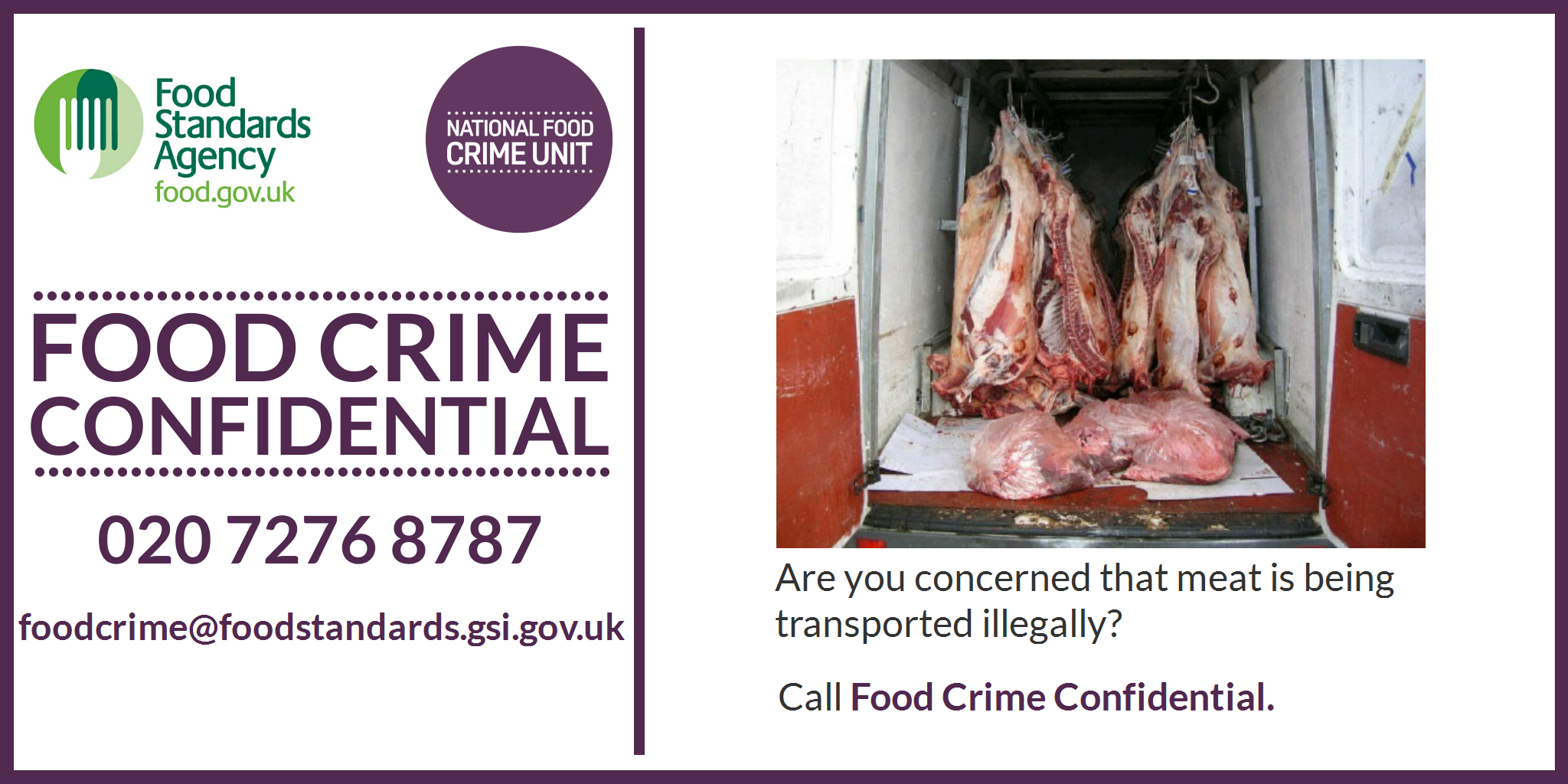Criminal activity is costing global food and drink industries billions, but what is being done about it? Andy Morling of the FSA’s National Food Crime Unit reports.

What does food have to do with the world of crime?
Consumers and food businesses can be disconnected by thousands of miles across the globe. From picking to packing, flavouring to refrigeration, there are multiple different processes that separate you from the hands of the farmer or farm worker that made your meal.
A lot can go wrong on that journey, from innocent mistakes to fraud and even high-level organised crime. Some commentators suggest that food crime costs the global food industry between $10Bn and $50Bn each year.
But across the world, people deserve to eat food that is safe, what the label says it is, and what they have worked hard to pay for. For this reason it is vital that consumers can be confident in the honesty and integrity of every person involved in bringing food from the farm to their fork.

Don’t scoff
Food crime matters because we unwittingly pay over the odds for substandard food products that can sometimes be injurious to our health. Whilst acute health impact is mercifully rare, little is known about long term harm to our health from exposure to some adulterants.
It also matters because food crime places unfair competitive pressures on legitimate food businesses around the world and, in so doing, distorts markets. This damages a nation’s economy and tarnishes its reputation abroad. But ultimately, food crime matters because it deprives us all of the basic right to choose what we take into our bodies.
Although there is no formal or legal definition of food crime, we use the term to describe any serious, dishonest conduct that impacts detrimentally on the quality or authenticity of food and drink. It might be a standard food product dishonestly misrepresented as fair trade or organic, barn eggs presented as free-range or farmed fish offered for sale as line caught. Extra virgin olive oil might be adulterated or replaced with a cheaper variety, premium cuts of lamb replaced with beef, or maybe even cocoa powder bulked out with soil.
Opportunities for food crime are truly endless and it has the potential to impact on almost any food product you can think of. This can occur at any point in the supply chain from primary production to retail. It can involve the industrial scale adulteration of an ingredient or the wholesale substitution of one foodstuff for another. The motivation of the food criminal is almost always financial.
Like all kinds of fraud, food crime is hidden, often well hidden, so accurately assessing its scale is extremely challenging. The stakes are high and, although with us for hundreds of years, food crime has only very recently been recognised as a discrete form of serious lawbreaking demanding a bespoke law enforcement response. The UK horsemeat incident of 2013 marked the turning point. It told us in no uncertain terms that in a truly global industry, food can be highly vulnerable to serious, transnational crime.
Action stations
The National Food Crime Unit (NFCU) where I now work was formed in 2015 to provide, for the first time in the UK, a law enforcement capability dedicated to tackling this type of threat. Set up by the UK’s Food Standards Agency (FSA, a partner in the Global Food Security programme) we work closely with partners and stakeholders, both in the UK and overseas, to identify and tackle serious criminal activity in food supply chains.
A key focus of our first year’s work has been increasing our understanding of the ‘big picture’ of food crime. In March, we published the Food Crime Annual Strategic Assessment (FCASA), the first of its kind anywhere in the world. The FCASA describes our current understanding of the criminal threat and highlights significant gaps in knowledge. It acts as a strategic baseline and provides a focus to the other work of the unit bringing offenders to justice.

Information is the lifeblood of the NFCU. It helps us identify and tackle those fraudulently exploiting consumers and businesses and lets us better understand the dynamics of the crime. Getting the right information, to the right people, at the right time, can make a huge difference.
As supply chains can be impossibly complex and opaque, information from those working in food businesses is vital to our work. Last week the NFCU launched Food Crime Confidential, a facility through which those working in and around the food industry can report suspicions that food is being dishonestly produced, manufactured or sold anywhere in the world.
In the UK we are fortunate to enjoy some of the best and safest food in the world – the aim of the National Food Crime Unit is to keep it that way and help others around the world do the same. If we really are what we eat, there can be no place for criminality of any kind within global food and drink supply chains.

About Andy Morling
Andy Morling joined the Food Standards Agency, with the task of building and leading the National Food Crime Unit (NFCU). His career in law enforcement spans more than 25 years and encompasses operational and senior leadership roles tackling most forms of serious and organised crime. Andy has spent the majority of his career working in intelligence and investigations for HM Revenue & Customs, the Serious Fraud Office, the Serious and Organised Crime Agency, and latterly the National Crime Agency, where he was a Senior Intelligence Lead.



It’s encouraging to see Food Crime is being discussed more openly and acknowledging that the risks are real but the true extent is unknown. However, whilst the NFCU focus is on highly organised food fraud and crime, there is still not enough being done at a local level to detect, investigate and prosecute food fraud and crime. The main challenge is not just resources and the ever reducing number of inspecting officers on the ground (Environmental Health and Trading Standards) but also the gaps in skills, experience, and co-ordination of local investigations. Food fraud and crime does not respect local authority boundaries or professional boundaries between EH, FSA and TS. As regulators with the responsibility to protect public health, too often opportunities will be missed to detect and unravel complex networks operating in the food trade, and particularly in the raw meat business. Whilst the priority will always be to remove unsafe food from sale, I suspect that opportunities to follow up the initial action to investigate the source of the supply are being missed. It is the unravelling of the supply network that takes the real time and effort. Therefore action to disrupt and seize unsafe food products may be the beginning and the end of the local action. We urgently need a review of the roles played by the Local Authorities, FSA and NFCU, and of course the Police. Food fraud is a crime and prosecution for fraud is likely to attract much higher financial penalties than a prosecution under food safety legislation. A successful prosecution for food fraud resulting in a high penalty for the perpetrator will help to dissuade criminals from choosing to switch from high risk and high penalty crime to softer crime such as food crime and fraud which is seen as low risk of detection and low financial penalties if caught. For this to work there needs to be absolute clarity on the roles the different agencies have to play and which organisation takes the lead in an investigation, and the role of other partners. We know that there will always be competing priorities for local resource, and so we need to have an agreement in place between organisations to commit and share resources across Local Authority and professional boundaries when the need arises. My final though is the essential part the public have to play in detecting food crime. The NFCU recent launch of Food Crime Confidential is a welcome step forward, but the focus appears to be on whistle blowers working within the food business sector. We need a similar approach targeting the consumer to look out for and report suspicious activity. Unrealistically cheap meat sales and offers of meat or food through social media sites, or even the local drinking establishments may all be sources of intelligence that should be reported. The old adage that if it “appears to be too good to be true then it probably is” – stills holds true and we as the local enforcement agency need to know about it. The local council Environmental Health service remains the main regulator for local food businesses and the public need to have more awareness of our role in protecting the public from food fraud, crime and exposure to risk from consumption of unfit food. Accepting that there is problem is the first step – now we need to be clear on what we do about it.
Thank you for your extremely insightful post Steve which highlights many important points. You are absolutely right in your analysis of the dynamics of food crime and how the local needs to be looked at in terms of its potential regional, national and indeed international implications. The National Food Crime Unit was established in part to do just that – to look upstream from local manifestations of low level dishonesty to identify serious criminality of a more organised kind. Joining up multiple dots is one of the key functions of our intelligence capability.
Your observation about the benefits of using the general criminal law (rather than food law) to investigate and prosecute offenders chimes absolutely with our ethos as a unit. The NFCU is staffed by law enforcement professionals with significant experience of serious and organised crime. We aim to leverage that expertise to both encourage and support local authorities in taking the fraud route where appropriate. I am acutely aware, however, that a fraud investigation, particularly where it straddles geographical boundaries, can be a major undertaking for a local authority, particularly in times of fiscal austerity. So the NFCU also aims to provide a coordination function as part of its support to local authorities in this space.
We are adopting a phased approach to the build of the National Food Crime Unit with the first being about identifying the nature and scale of the food crime threat. As my article hopefully indicated, this is proving somewhat challenging given the structural characteristics of food crime. Getting to grips with any ‘new’ form of crime presents challenges and inevitably it will take time before the response matches the threat. But as another incident of the scale and complexity of horsemeat could theoretically emerge at any time, we cannot afford to be complacent. For that reason, the FSA has brought forward a scheduled review of the first phase of the NFCU build to this autumn. The review will consider the extent of any additional capabilities and capacity needed by the unit to enhance its ability to detect serious food related criminality and also to provide an appropriate criminal justice or other response to it. The outcome of the review is likely to be known by the end of the calendar year.
Our Food Crime Confidential facility is open to anyone and everyone who may have information, however insignificant it may appear, on dishonesty within food supply chains. Whilst I personally believe that those working in and around the industry are often in a better position to identify wrong-doing, the aim is certainly not to exclude consumers. The interests of consumers drive everything we do but in respect of food crime, my assessment is that they will generally be the last to know that what they are purchasing is not what it says it is. Just as the successful parasite will not injure its host, so it is that it’s not in the interests of a successful fraudster to injure his victim. So in most cases, it will be extremely difficult for the consumer to know they have been sold sub-standard food. This is where the fundamental knowledge imbalance in food crime lies. But the point you make about deals being too good to be true is a good one and I would certainly encourage consumers to report these things to us through Food Crime Confidential.
Thanks for sharing Andy! Food companies that change labels to exploit consumers should also be held accountable for misguidance and loss of revenues.